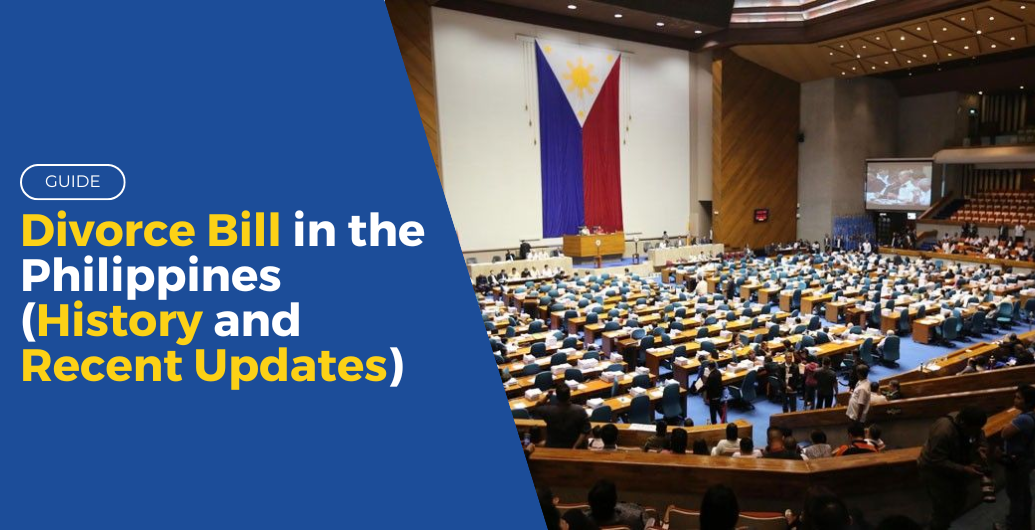The passage and approval of the Divorce Bill have been long standing issues in the predominantly Catholic Philippines. Traditionalist and conservative individuals openly oppose the legalization of divorce. However, with the bill approved on its third and final reading in the House of Representatives and now awaiting further action in the Senate, tensions are rising. This guide walks through the history of the Divorce Bill in the Philippines and provides the latest updates on its progress.
Divorce Bill
House Bill 9349, also known as the Absolute Divorce Act, is an act reinstituting absolute divorce as an alternative mode for the dissolution of marriage. This bill is aimed at couples who feel their relationship no longer benefits them or those around them. It provides a legal means for couples to part ways, especially for those who have experienced violence, neglect, or abuse in their marriage.
In the Philippines, failed marriages are currently addressed through legal separation and annulment. Legal separation allows couples to live separately and manage their affairs but does not end the marriage, preventing remarriage. Grounds for legal separation include physical violence, drug addiction, and infidelity.
Annulment, on the other hand, voids the marriage as if it never existed. This allows both parties to remarry. Grounds for annulment are more specific, such as lack of parental consent or mental incapacity. Moreover, it is harder to obtain compared to legal separation.
Grounds for Divorce in the Philippines
Unlike legal separation and annulment, proposed divorce bill in the Philippines offer broader grounds for ending a marriage. These grounds, which can exist after marriage, include rape by a spouse, prolonged separation, irreconcilable differences, valid overseas divorces, and religious annulments.
The divorce process, filed in the Regional Trial Court, includes a cooling-off period to prevent impulsive decisions. Once granted, divorce allows immediate remarriage, regardless of ongoing appeals for support, child custody, or property division.
Divorce throughout the years in the Philippines
In the pre-colonial Philippines, indigenous groups such as the Tagbanwans, Igorots, Manobos, B’laans, and Muslims practiced divorce, reflecting a liberal attitude towards marital dissolution. This openness posed a challenge to the introduction of Catholicism.
Meanwhile, in March 1917, under American colonial rule, Act No. 2710 introduced absolute divorce for adultery and concubinage. During the Japanese occupation in March 1943, Executive Order No. 141 replaced this law but was reverted back to Act No. 2710 by General Douglas MacArthur in October 1944. However, the 1949 Civil Code of the Philippines entirely abolished divorce.
In February 1977, President Ferdinand Marcos allowed divorce for Muslim Filipinos through Presidential Decree No. 1083. Moreover, efforts to legalize divorce for all Filipinos resurfaced in 1999 and 2001 but failed to pass.
In August 2010, the Gabriela party list introduced House Bill 1799 to legalize divorce, yet it faced strong opposition and minimal support. Despite these efforts, divorce remains prohibited under the current Philippine civil code.
Also Read: GUIDE: How to Request a PSA Marriage Certificate Online
Divorce Bill in the Philippines in 2023
Since March 2023, significant strides have been made towards legalizing divorce in the Philippines. The House Committee on Population and Family Relations approved the proposed Divorce Act, with Albay Representative Edcel Lagman highlighting this as a step towards aligning with global norms on marital dissolution.
In September 2023, the Senate Committee on Women, Children, Family Relations and Gender approved Senate Bill No. 2443, which broadens the grounds for divorce.
By May 2024, the House of Representatives passed House Bill 9348 on its third and final reading, marking a shift in societal attitudes towards marriage.
However, as of now, the Forwarding of divorce bill to the Senate is on hold. House Secretary General Reginald Velasco stated that the adjustment aimed to clarify the final voting outcome for House Bill No. 9349. Initially, 126 lawmakers voted in favor of the bill, 109 were against it, and 20 abstained. However, the count for those who supported the bill was later revised to 131. This led opponents of the bill, including former Senate President Tito Sotto and conservative evangelists Manila Rep. Bienvenido Abante and Cibac Rep. Eddie Villanueva, to question the accuracy of the vote tally.
The last time a divorce bill passed the final reading was during the 17th Congress. However, it did not progress in the Senate. The current Senate version of the divorce bill, SB No. 2443, was filed by Hontiveros, Tulfo, Padilla, Cayetano, and Marcos. It successfully cleared the committee level last year, marking the first time since 1986, but has yet to advance further.
Final Thoughts
The ongoing debate over the Divorce Bill in the Philippines reflects the country’s complex relationship with marriage. Undeniably, it is only one of the many aspects which is shaped by deep-rooted religious beliefs and evolving societal norms. As one of the last two sovereign states without legalized divorce, the Philippines has seen significant progress with the Absolute Divorce Bill in May 2024. However, the journey to legalize divorce is still contentious, facing strong opposition from religious groups and traditionalists.
As the country stands on the brink of aligning with global norms, it must navigate these clashing perspectives to ensure that the law serves the best interests of all Filipinos. This involves balancing the need for marital dissolution with respect for humanity and ensuring equal access, rather than adhering to biased cultural and religious values.
Keep Reading: GUIDE: How to Request a PSA CENOMAR Online



Leave a Reply